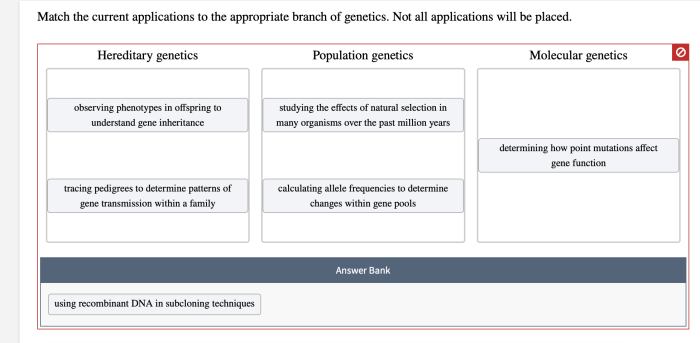Match the current applications to the appropriate branch of genetics – Matching current applications to the appropriate branch of genetics is crucial for optimizing genetic research and advancements. This process involves aligning specific applications with the expertise and techniques of different genetic branches, ensuring efficient utilization of resources and maximizing the potential impact of genetic technologies.
The field of genetics encompasses various branches, each with its distinct focus and applications. Medical genetics, for example, delves into the genetic basis of human diseases and disorders, while agricultural genetics explores the genetic improvement of crops and livestock. Understanding the diverse applications of genetics, ranging from personalized medicine to forensic science, is essential for effective matching.
Introduction

Matching genetic applications to the appropriate branch of genetics is crucial for optimizing outcomes and ensuring the efficient use of resources. By aligning applications with the expertise and techniques of specific branches, researchers can maximize the potential benefits and mitigate potential challenges associated with genetic research and its applications.
This process involves carefully considering the nature of the application, its goals, and the available genetic resources. It requires a deep understanding of the different branches of genetics and their respective strengths and limitations. The benefits of matching applications to the appropriate branch include increased accuracy, efficiency, and cost-effectiveness.
However, challenges may arise due to the complexity of genetic data, the rapid pace of technological advancements, and ethical considerations.
Branches of Genetics

Medical Genetics
Focuses on the genetic basis of human diseases, including the identification of genetic variants associated with disorders, developing diagnostic tests, and providing genetic counseling to individuals and families.
Molecular Genetics
Studies the structure and function of genes at the molecular level, including DNA sequencing, gene expression analysis, and genetic engineering techniques.
Population Genetics
Examines the genetic variation within populations, including the study of genetic diversity, gene flow, and the impact of selection pressures on genetic evolution.
Quantitative Genetics
Investigates the genetic basis of complex traits, such as height, weight, and intelligence, which are influenced by multiple genes and environmental factors.
Cytogenetics
Studies the structure and function of chromosomes, including the identification of chromosomal abnormalities associated with genetic disorders.
Forensic Genetics
Applies genetic principles to legal investigations, such as DNA fingerprinting for identification and paternity testing.
Agricultural Genetics, Match the current applications to the appropriate branch of genetics
Focuses on the genetic improvement of crops and livestock, including the development of new varieties with desirable traits, such as increased yield or resistance to pests and diseases.
Evolutionary Genetics
Studies the genetic basis of evolutionary processes, including the mechanisms of genetic variation, natural selection, and speciation.
Application Categories
- Medical diagnostics
- Genetic counseling
- Forensic science
- Agricultural biotechnology
- Pharmacogenetics
- Personalized medicine
- Genetic engineering
- Population studies
- Conservation genetics
Matching Applications to Branches

| Application | Branch of Genetics | Rationale |
|---|---|---|
| Identification of genetic variants associated with cancer | Medical Genetics | Medical Genetics focuses on the genetic basis of human diseases, including the identification of genetic variants associated with disorders. |
| Gene expression analysis in response to environmental stimuli | Molecular Genetics | Molecular Genetics studies the structure and function of genes at the molecular level, including gene expression analysis. |
| Estimation of genetic diversity within a population | Population Genetics | Population Genetics examines the genetic variation within populations, including the study of genetic diversity. |
| Prediction of genetic risk for complex traits | Quantitative Genetics | Quantitative Genetics investigates the genetic basis of complex traits, such as height, weight, and intelligence, which are influenced by multiple genes and environmental factors. |
| Detection of chromosomal abnormalities in prenatal diagnosis | Cytogenetics | Cytogenetics studies the structure and function of chromosomes, including the identification of chromosomal abnormalities associated with genetic disorders. |
| DNA fingerprinting for identification in forensic investigations | Forensic Genetics | Forensic Genetics applies genetic principles to legal investigations, such as DNA fingerprinting for identification. |
| Development of genetically modified crops with improved yield | Agricultural Genetics | Agricultural Genetics focuses on the genetic improvement of crops and livestock, including the development of new varieties with desirable traits, such as increased yield. |
| Study of genetic mechanisms underlying evolutionary processes | Evolutionary Genetics | Evolutionary Genetics studies the genetic basis of evolutionary processes, including the mechanisms of genetic variation, natural selection, and speciation. |
User Queries: Match The Current Applications To The Appropriate Branch Of Genetics
What are the benefits of matching applications to the appropriate branch of genetics?
Matching applications to the appropriate branch of genetics ensures that the most suitable expertise, techniques, and resources are utilized for each application. This leads to more efficient research, accurate results, and effective implementation of genetic technologies.
What are the challenges in matching applications to the appropriate branch of genetics?
Matching applications to the appropriate branch of genetics can be challenging due to the rapidly evolving nature of genetic technologies and the increasing complexity of genetic applications. Additionally, the interdisciplinary nature of genetics often requires collaboration across multiple branches.
How can the process of matching applications to the appropriate branch of genetics be improved?
The process of matching applications to the appropriate branch of genetics can be improved by developing standardized guidelines, promoting interdisciplinary collaboration, and investing in training and education for researchers and practitioners.